|
|
|
Sort Order |
|
|
|
Items / Page
|
|
|
|
|
|
|
| Srl | Item |
| 1 |
ID:
179341
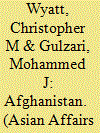

|
|
|
|
|
| Summary/Abstract |
This article is about the interplay of defining characteristics in Afghanistan that led to the fall of King Amanullah in 1929. Previously, this has been done by looking at the reforms, tribal society and the ulema, the community of scholars, but the prism through which we examine Amanullah's downfall is Mahmud Tarzi's grouping together of ‘Din, Daulat, Watan, Millat' (Religion, State, Homeland (or Fatherland), Nation). The ideals informing this grouping, as well as the concepts themselves, were key factors underpinning Amanullah’s reform agenda. Where Tarzi wrote of these factors as integrative and functioning together, a perspective taken uncritically by many commentators, we argue here that, as concepts in governance intended to unify the country, they acted as the exact opposite; that they sparked off each other, contradicted each other, and undermined each other in the context of the period. Understanding this explains much of the fragmentation Afghanistan suffered in the 1920s and suggests a structural process of causation for the fall of Amanullah.
|
|
|
|
|
|
|
|
|
|
|
|
|
|
|
|
| 2 |
ID:
132102
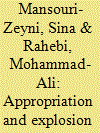

|
|
|
|
|
| Publication |
2014.
|
| Summary/Abstract |
The two of us wrote Anti-Oedipus together. Since each of us was several, there was already quite a crowd.
-Deleuze and Guattari, A Thousand Plateaus
With the linguistic turn came an ever-increasing tendency to see language as the locus where truths are born, passed along, or modified. As such, postmodern theories have proved highly compatible with postcolonial studies, which have inspired studies of modern Iran as a country that was colonized, only not officially. However, the latter seem to have fallen for extreme abstraction where metaphysical claims abound: presuming constructivist views of language but failing to present a tangible framework, these studies discuss "discursive change" without giving a clue as to what either discourse or change is. Convinced as such, we have adopted Wittgenstein's idea of language-games to present a tangible model for discursive change.
|
|
|
|
|
|
|
|
|
|
|
|
|
|
|
|
| 3 |
ID:
191955
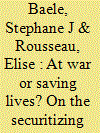

|
|
|
|
|
| Summary/Abstract |
This paper offers a multi-dimensional analysis of the ways and extent to which the US president and UK prime minister have securitized the Covid-19 pandemic in their public speeches. This assessment rests on, and illustrates the merits of, both an overdue theoretical consolidation of Securitization Theory’s (ST) conceptualization of securitizing language, and a new methodological blueprint for the study of ‘securitizing semantic repertoire’. Comparing and contrasting the two leaders’ respective securitizing semantic repertoires adopted in the early months of the coronavirus outbreak shows that securitizing language, while very limited, has been more intense in the UK, whose repertoire was structured by a biopolitical imperative to ‘save lives’ in contrast to the US repertoire centred on the ‘war’ metaphor.
|
|
|
|
|
|
|
|
|
|
|
|
|
|
|
|
| 4 |
ID:
192078


|
|
|
|
|
| Summary/Abstract |
During the South Korean president’s state visit to Australia in December 2021, the Australian Government and in turn the Australian media sustained a narrative that the two countries held ‘common strategic interests’. Over the past ten years, the notion of common strategic interests became a ‘naturalized narrative’ in Australia – a narrative, which through entrenched repetition becomes both natural and inevitable to such an extent that counter-narratives are seen as counterintuitive and open to ridicule.
This study investigates the common strategic interests narrative. It first explores the bilateral relationship and the narrative gap that occurred during the president’s visit. It then turns to the use of language and narrative in bilateral relationships. It looks at how the constituent components supporting the common strategic interests narrative are contextualized and how this impacts the political action of Australia and Korea.
The study finds that the common strategic interests narrative does not cross the linguistic-cultural divide in the Australia-Korea bilateral relationship. The article concludes with policy recommendations. Australia needs to pay more attention to building policy relevance and education links in South Korea.
|
|
|
|
|
|
|
|
|
|
|
|
|
|
|
|
| 5 |
ID:
185948
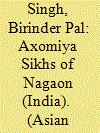

|
|
|
|
|
| Summary/Abstract |
In the villages of Nagaon district of Assam(India), Axomiya Sikhs are residing for the past two centuries. They are the believers and practitioners of their religion though not averse to local customs and festivals. They are immersed in the language and culture of Assam and many have got name and fame in their respective fields including Assamese literature. They claim to be the descendants of Sikh soldiers from Punjab sent there by Maharaja Ranjit Singh to help the Ahom ruler in 1820. The present paper explores the question of their social, religious and linguistic identity. They were contented with themselves until they interacted with the Punjabi Sikhs in Assam, relatively recent settlers, who call them ‘duplicate Sikhs’. They are now in a dilemma with regard to their Sikh identity. The data are collected from a sample of 365 respondents. This is the only empirical study after Medhi’s work in 1989.
|
|
|
|
|
|
|
|
|
|
|
|
|
|
|
|
| 6 |
ID:
120017
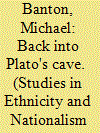

|
|
|
| 7 |
ID:
097665
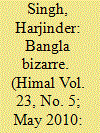

|
|
|
| 8 |
ID:
092154
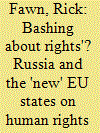

|
|
|
|
|
| Publication |
2009.
|
| Summary/Abstract |
During the August War of 2008, many Western governments that had previously been supporters of Georgia tempered their views on the causes of the conflict and moderated their support for the government of Mikhal Saakashvili. By contrast, the governments of several post-communist countries were forthright in their backing of Georgia. The presidents or prime ministers of Poland, Estonia, Latvia and Lithuania, as well as Ukraine, even travelled to Georgia during the war to demonstrate their solidarity.
|
|
|
|
|
|
|
|
|
|
|
|
|
|
|
|
| 9 |
ID:
104136
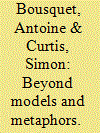

|
|
|
|
|
| Publication |
2011.
|
| Summary/Abstract |
The concepts, language and methods of complexity theory have been slowly making their way into international relations (IR), as scholars explore their potential for extending our understanding of the dynamics of international politics. In this article we examine the progress made so far and map the existing debates within IR that are liable to being significantly reconfigured by the conceptual resources of complexity. We consider the various ontological, epistemological and methodological questions raised by complexity theory and its attendant worldview. The article concludes that, beyond metaphor and computational models, the greatest promise of complexity is a reinvigoration of systems thinking that eschews the flaws and limitations of previous instantiations of systems theory and offers an array of conceptual tools apposite to analysing international politics in the twenty-first century.
|
|
|
|
|
|
|
|
|
|
|
|
|
|
|
|
| 10 |
ID:
140480
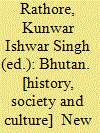

|
|
|
|
|
| Publication |
New Delhi, Lenin Media Private Limited, 2015.
|
| Description |
vii, 288p.hbk
|
| Standard Number |
9789385160738
|
|
|
|
|
|
|
|
|
|
|
|
Copies: C:1/I:0,R:0,Q:0
Circulation
| Accession# | Call# | Current Location | Status | Policy | Location |
| 058278 | 954.5498/RAT 058278 | Main | On Shelf | General | |
|
|
|
|
| 11 |
ID:
169043
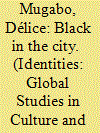

|
|
|
|
|
| Summary/Abstract |
Montreal, a city delimited by a French-speaking East and an English-speaking West, is often used as an example of how language can organize urban landscapes. That said, examining Black life in Montreal complicates that tidy narrative by illustrating how race, not language, configures the city. Broadly, this study examines the way racial and linguistic divisions play out in the geography of the city. More specifically, as it is grounded in Black geography and cultural geography, this paper highlights how Black activists in the 1990s made explicit the many ways in which Blackness in Montreal was rooted in a history and a geography that exceeds urban and national boundaries. Contesting an ethnicization that marked their Haitianness as outside Blackness, these activists also bridged smaller-scale divisions: those inscribed at the scale of the city that placed Haitians in the East and Black anglophone people in the West.
|
|
|
|
|
|
|
|
|
|
|
|
|
|
|
|
| 12 |
ID:
130855
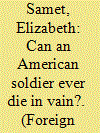

|
|
|
| 13 |
ID:
156108
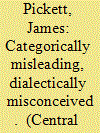

|
|
|
|
|
| Summary/Abstract |
Persian language manuals uniformly adopt national categories such as Persian/Farsi (Iran), Dari (Afghanistan) and Tajik (Tajikistan). These categories at once impose an imagined contrast between the languages at the high register that is in fact marginal, while occluding profound linguistic variation within these nation-states at colloquial registers. Similar schemas apply to Central Asian Turkic languages such as Uyghur and Uzbek, which are closely related at the formal/literary register, but regionally diverse at lower registers. This dominant instructional approach ill prepares language learners for engaging the region on its own terms, rather than through the lens of nationalist aspirations. Students would be better served by an integrative method that teaches a transnational high language (in the case of Persian) while introducing a diverse range of dialects.
|
|
|
|
|
|
|
|
|
|
|
|
|
|
|
|
| 14 |
ID:
140762
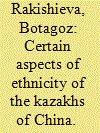

|
|
|
|
|
| Summary/Abstract |
There are about 5 million Kazakhs living all over the world outside the Republic of Kazakhstan, the largest part of them predictably found in the Xinjiang-Uyghur Autonomous Region of the PRC bordering on Kazakhstan
|
|
|
|
|
|
|
|
|
|
|
|
|
|
|
|
| 15 |
ID:
068149
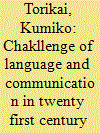

|
|
|
| 16 |
ID:
029759
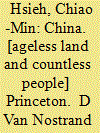

|
|
|
|
|
| Publication |
Princeton, D Van Nostrand company inc., 1967.
|
| Description |
vi, 138p.pbk
|
|
|
|
|
|
|
|
|
|
|
|
Copies: C:1/I:0,R:0,Q:0
Circulation
| Accession# | Call# | Current Location | Status | Policy | Location |
| 003950 | 951/HSI 003950 | Main | On Shelf | General | |
|
|
|
|
| 17 |
ID:
096833
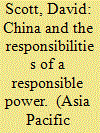

|
|
|
| 18 |
ID:
090898
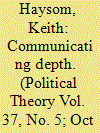

|
|
|
|
|
| Publication |
2009.
|
| Summary/Abstract |
This essay takes as its task the critical comparison of two thinkers who are rarely matched or studied in tandem: Jürgen Habermas and Maurice Merleau-Ponty. It stages a (largely) speculative dialogue between the two thinkers, considering not only the points of convergence but their likely objections to each other's accounts of communication and language. I will argue that Merleau-Ponty, whose own concerns significantly overlap with Habermas's, while simultaneously pulling in a different direction, serves as a useful counter-point to Habermas. This is so because Merleau-Ponty offers us an intersubjectivist account of praxis, from which can be extrapolated an ethics of communicative engagement between self, other, and world. Such a phenomenological and/or existential rereading of the central Habermasian problematic not only compensates for the notorious abstraction of Discourse Ethics, but better underscores possibilities for social transformation inherent in intersubjectivity and the lifeworld than are acknowledged by Habermas.
|
|
|
|
|
|
|
|
|
|
|
|
|
|
|
|
| 19 |
ID:
098070
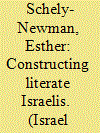

|
|
|
| 20 |
ID:
048542
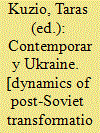

|
|
|
|
|
| Publication |
London, M E Sharpe, 1998.
|
| Description |
xxi, 290p.: tables, figures, maps.hbk
|
| Standard Number |
0765602237
|
|
|
|
|
|
|
|
|
|
|
|
Copies: C:1/I:0,R:0,Q:0
Circulation
| Accession# | Call# | Current Location | Status | Policy | Location |
| 040279 | 947.71/KUZ 040279 | Main | On Shelf | General | |
|
|
|
|
|
|
|
|
|